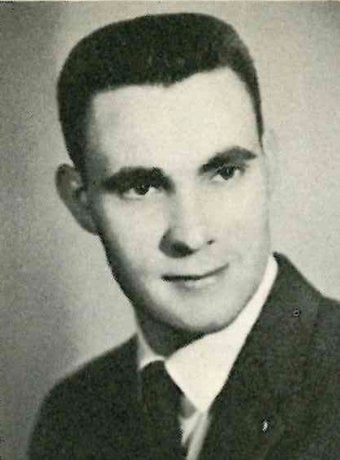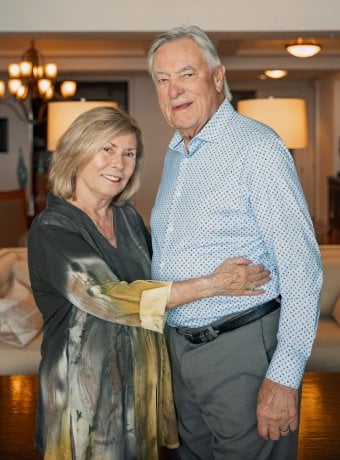Husky alumnus Jim Mack's determination and commitment to excellence led him from humble means to becoming CEO of a half-billion-dollar company.
"I was never ready to do less than my best," said Jim Mack '59 (BA Chemical Engineering), reflecting on an improbable life story that saw him go from running his own bait business as a kid to becoming CEO of a major public company. Now, Mack and his wife Lorna live out their "never-less-than-best" mindset through philanthropic support of dozens of organizations—including Michigan Tech, a place that helped set Mack on the path to success.
"I have had a measure of success in my life based mostly on the fundamentals of problem-solving learned at MTU," he said. "If you're going to complete your work at Tech, you have to have a lot of determination. The same is true in business. Adversity pops up and you have to have the tenacity and determination to work your way through it."
Surveying His Options
Born in Detroit in 1937, Mack's father left the family when he was three years old. His mother moved him, his brother, and his sister to Mackinaw City, where she opened her own beauty shop. Mack recalls spending a lot of time outdoors. "We didn't have TV, so we entertained ourselves by being outside in all seasons."
During summers, Mack caught and sold red leeches for 10 cents apiece. He later worked at a gas station and helped do surveying work. Among the surveying projects he helped complete was the K. I. Sawyer Air Force Base near Gwinn, Michigan, now used as Marquette County's primary passenger airport.
Mack graduated as valedictorian of his high school class while participating in football, basketball, and track. His school was not big enough to have a guidance counselor, so he had no real plans for furthering his education until recruiters from Michigan Tech came to town his senior year. "They talked about the programs, tuition costs, and the branch in Sault Ste. Marie," he said. "No one in my family had gone to college, but my grandfather was a self-taught engineer who told me I'd always have work if I was an engineer."
Mack sought advice from a local grocery store owner—a Michigan Tech alum who said Mack could do well if he applied himself. Having previously visited the University of Michigan and Michigan State University, Mack knew he wouldn't fit in on a large college campus. He decided Tech was his best option.
"My mother had remarried, but still couldn't afford to send me to college," Mack remembered. "Tech offered one scholarship to the Soo Branch, and I got it." Choosing to study chemical engineering in part because the Tech recruiters told him it was the most difficult course of study, he also received a scholarship from Universal Oil Products that covered a third of his tuition. The scholarships, plus the money he had saved from summer jobs, made it possible for him to enroll.

Leader of the Pack
"I fit right in," Mack said. "Classes were small—like 10 students in a class." Mack remembered his professors as tough but caring, particularly those in chemical engineering and mathematics.
Mack and his roommate both joined the US Army ROTC program soon after enrolling at Tech. He had been taught to fly by his stepfather, so Mack later switched to the US Air Force ROTC with the hopes of attending flight school after graduation. "The first real 'aha' moment came at college," Mack said. "I was selected as commandant of cadets and later earned the distinguished award, which would have allowed me a regular commission instead of reserve. Having other people recognize my leadership was a wake-up call. I didn't have that self-awareness that I was a leader until that moment."
After two years in Sault Ste. Marie, Mack moved Houghton to finish his degree. He continued in AFROTC and joined the Sigma Rho fraternity. "I regularly stayed up until one or two in the morning studying," Mack said. "Other students were satisfied doing just enough to get a passing grade. I could never do that."
A Great Career Takes Flight
With plans to join active duty and attend flight school after graduation, Mack was shocked to find out he wasn't accepted because of a medical condition. "I had put on my initial application to the military that I had hay fever as a kid. That disqualified me."
Instead of flight school, they offered to send Mack to graduate school, pay for his doctorate, and have him teach at the academy. "I could have retired as a bird colonel in 20 years. It was an interesting opportunity, but I didn't want the next 25 years of my life planned out like that."
Mack instead took a position with Monsanto in Springfield, Massachusetts, as a project engineer. "I think I had the second-highest starting salary of anyone in the graduating class. It was $530 a month." While working for Monsanto, Mack went to night school to earn his MBA.
Wanting to return to the Midwest, Mack took a job at Maumee Chemical in Toledo, Ohio. He worked both in the plant and their off-site office. By chance, he left their plant on the morning of May 10, 1962. That afternoon, an explosion leveled the plant, killing 10 workers and injuring dozens more.
Mack continued working for Maumee Chemical for several years. It was bought by Sherwin-Williams, and Mack was promoted to director of sales and marketing and eventually president of the company's chemical division.
When Sherwin-Williams decided to get out of chemicals in 1982, Mack took a position as executive vice president of Oakite Products in New Jersey. In 1984, he was hired away by Olin Corporation as vice president and general manager of their worldwide urethanes and specialty chemicals business.
In 1990, he joined Cambrex as president and CEO. "It had become a goal of mine to become a president of a public company," he said. He helped grow the worldwide biotechnology and pharmaceutical company, headquartered in East Rutherford, New Jersey, from $130 million to $500 million. In both 2002 and 2003, Mack was recognized by Ernst & Young as the Entrepreneur of the Year for New Jersey. He also was the chair of the Synthetic Organic Chemicals Manufacturing Association. He retired from the company as Chairman in 2008.

The Macks Give Back
"There are no shortcuts at Tech or in life. You either meet the requirements or you don't," Mack said. "The discipline that you get at Michigan Tech—the ability to define a problem and solve it—was one of the key things I've learned."
Mack's support of Michigan Tech started in the 1980s when Tom Rhuby asked him to help raise funds for the University. He went on to volunteer for 10 years on the Michigan Tech Fund Board of Directors, serve on Curt Thompkins' presidential advisory board, and be inducted into the Distinguished Academy of Chemical Engineering. Mack earned the Board of Trustees Silver Medal in 1999 and delivered the Midyear Commencement address in 2000, when he also received an honorary Doctor of Philosophy in Engineering degree.
The Macks have given many gifts to Michigan Tech, including funding the creation of the James and Lorna Mack Endowed Chair in Bioengineering and the James and Lorna Mack Endowed Scholarship. Recently, the Macks created the James and Lorna Mack Endowed Chair in Continuous Processing to retain and attract another high-quality faculty member who is at the top of their profession, can inspire students to think creatively in solving problems, and is able to integrate the latest research into the education and training of students.
"My wife and I believe advanced education is the foundation for growth and prosperity for both the individual and for the nation," Mack said. "Michigan Tech made a huge difference in my life and career. We want to give back to Tech in ways that can help students realize their full potential and create pathways for them to have successful careers."
Michigan Technological University is an R1 public research university founded in 1885 in Houghton, and is home to nearly 7,500 students from more than 60 countries around the world. Consistently ranked among the best universities in the country for return on investment, Michigan's flagship technological university offers more than 185 undergraduate and graduate degree programs in science and technology, engineering, computing, forestry, business, health professions, humanities, mathematics, social sciences, and the arts. The rural campus is situated just miles from Lake Superior in Michigan's Upper Peninsula, offering year-round opportunities for outdoor adventure.




